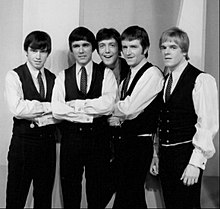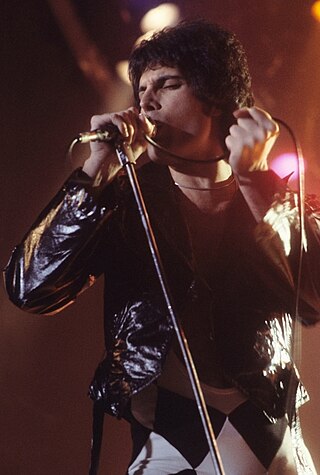
Freddie Mercury was a British singer and songwriter who achieved worldwide fame as the lead vocalist and pianist of the rock band Queen. Regarded as one of the greatest singers in the history of rock music, he was known for his flamboyant stage persona and four-octave vocal range. Mercury defied the conventions of a rock frontman with his theatrical style, influencing the artistic direction of Queen.

The British Invasion was a cultural phenomenon of the mid-1960s, when rock and pop music acts from the United Kingdom and other aspects of British culture became popular in the United States with significant influence on the rising "counterculture" on both sides of the Atlantic Ocean. UK pop and rock groups such as the Beatles, the Rolling Stones, the Who, the Kinks, the Zombies, Small Faces, the Dave Clark Five, The Spencer Davis Group, Herman's Hermits, the Hollies, the Animals, Gerry and the Pacemakers, the Searchers, the Yardbirds, Them, and Manfred Mann, as well as solo singers such as Dusty Springfield, Cilla Black, Petula Clark, Tom Jones and Donovan, were at the forefront of the "invasion".
Skiffle is a genre of folk music with influences from American folk music, blues, country, bluegrass, and jazz, generally performed with a mixture of manufactured and homemade or improvised instruments. Originating as a form in the United States in the first half of the 20th century, it became extremely popular in the United Kingdom in the 1950s, where it was played by such artists as Lonnie Donegan, the Vipers Skiffle Group, Ken Colyer, and Chas McDevitt. Skiffle was a major part of the early careers of some musicians who later became prominent jazz, pop, blues, folk, and rock performers, the Quarrymen and Rory Gallagher among them. It has been seen as a critical stepping stone to the second British folk revival, the British blues boom, and the British Invasion of American popular music.

The Dave Clark Five, also known as the DC5, were an English rock and roll band formed in 1958 in Tottenham, London. Drummer Dave Clark served as the group's leader, producer and co-songwriter. In January 1964, they had their first UK top-ten single, "Glad All Over", which knocked the Beatles' "I Want to Hold Your Hand" off the top of the UK Singles Chart. It peaked at No. 6 in the United States in April 1964. Although this was their only UK No. 1, they topped the US chart in December 1965, with their cover of Bobby Day's "Over and Over". Their other UK top-ten hits include "Bits and Pieces", "Can't You See That She's Mine", "Catch Us If You Can", "Everybody Knows", "The Red Balloon", "Good Old Rock 'n' Roll", and a version of Chet Powers' "Get Together".
Folk rock is a genre of rock music with heavy influences from English folk and American folk music. Combining the elements of folk and rock music, it arose in the United States, Canada, and the United Kingdom in the mid-1960s. In the U.S., folk rock emerged from the folk music revival. Performers such as Bob Dylan and the Byrds—several of whose members had earlier played in folk ensembles—attempted to blend the sounds of rock with their pre-existing folk repertoire, adopting the use of electric instrumentation and drums in a way previously discouraged in the U.S. folk community. The term "folk rock" was initially used in the U.S. music press in June 1965 to describe the Byrds' music.

Andrew Loog OldhamNote 1 is an English record producer, talent manager, impresario and author. He was manager and producer of the Rolling Stones from 1963 to 1967, and was noted for his flamboyant style.
Beat music, British beat, or Merseybeat is a British popular music genre that developed, particularly in and around Liverpool, in the late 1950s and early 1960s. The genre melded influences from British and American rock and roll, rhythm and blues, skiffle, traditional pop and music hall. It rose to mainstream popularity in the UK and Europe by 1963 before spreading to North America in 1964 with the British Invasion. The beat style had a significant impact on popular music and youth culture, from 1960s movements such as garage rock, folk rock and psychedelic music.

Dick and Dee Dee are an American singer-songwriter duo who reached popularity in the early to mid-1960s. The group was founded by California classmates Richard Gosting and Mary Sperling. They eventually changed their names to Dick St. John and Dee Dee Sperling. They had their first hit in 1961 when "The Mountain's High" reached No. 2 on the Billboard 100. They toured with the Beach Boys and opened for the Rolling Stones during the Stones's 1964 tour of California. Regulars on the show Shindig!, the duo had multiple hit songs before St. John and Sperling disbanded in 1969. In the 1980s, St. John toured with his wife, Sandy. Dick St. John died on December 27, 2003, after a fall at his home. Dee Dee Phelps began performing with actor/singer Michael Dunn as Dick and Dee Dee in 2008, appearing in large doo wop and rock and roll shows throughout the United States.
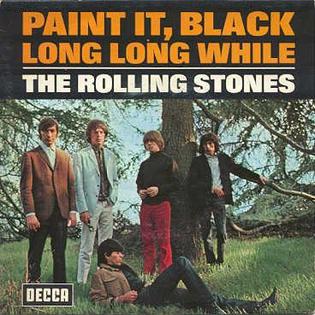
"Paint It Black" is a song by the English rock band the Rolling Stones. A product of the songwriting partnership of Mick Jagger and Keith Richards, it is a raga rock song with Indian, Middle Eastern and Eastern European influences and lyrics about grief and loss. London Records released the song as a single on 7 May 1966 in the United States, and Decca Records released it on 13 May in the United Kingdom. Two months later, London Records included it as the opening track on the American version of the band's 1966 studio album Aftermath, though it is not on the original UK release.
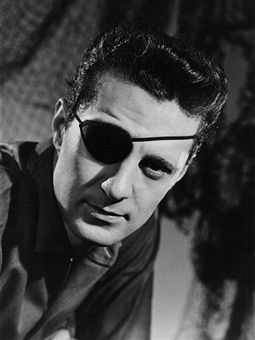
Frederick Albert Heath, known professionally as Johnny Kidd, was an English singer-songwriter, best remembered as the lead vocalist for the rock and roll band Johnny Kidd & the Pirates. He was one of the few pre-Beatles British rockers to achieve worldwide fame, mainly for his 1960 hit, "Shakin' All Over".
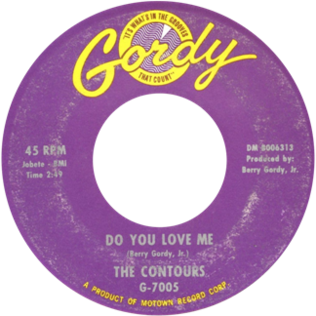
"Do You Love Me" is a rhythm and blues song recorded by the Contours in 1962. Written and produced by Motown Records owner Berry Gordy Jr., it appeared twice on the Billboard Hot 100 chart, reaching numbers three in 1962 and eleven in 1988.
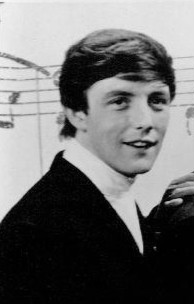
Michael George Smith was an English singer, songwriter and music producer.
Freddie Bell and the Bellboys were an American vocal group, influential in the development of rock and roll in the 1950s. Their recordings include "Hound Dog", "The Hucklebuck" and "Giddy Up a Ding Dong".

"Glad All Over" is a song written by Dave Clark and Mike Smith and recorded by The Dave Clark Five.
Tony Calder was an English record manager, impresario, talent-spotter, promoter and public relations agent. He was Andrew Loog Oldham's business partner from 1963 to December 1969.
British rock and roll, or sometimes British rock 'n' roll, is a style of popular music based on American rock and roll, which emerged in the late 1950s and was popular until the arrival of beat music in 1962. It was important in establishing British youth and popular music culture and was a key factor in subsequent developments that led to the British Invasion of the mid-1960s. Since the 1960s, some stars of the genre, most notably Cliff Richard, have managed to sustain successful careers and there have been periodic revivals of this form of music.
British pop music is popular music, produced commercially in the United Kingdom. It emerged in the mid-to late 1950s as a softer alternative to American rock 'n' roll. Like American pop music it has a focus on commercial recording, often orientated towards a youth market, as well as that of the Singles Chart usually through the medium of relatively short and simple love songs. While these basic elements of the genre have remained fairly constant, pop music has absorbed influences from most other forms of popular music, particularly borrowing from the development of rock music, and utilising key technological innovations to produce new variations on existing themes. From the British Invasion in the 1960s, led by The Beatles, British pop music has alternated between acts and genres with national appeal and those with international success that have had a considerable impact on the development of the wider genre and on popular music in general
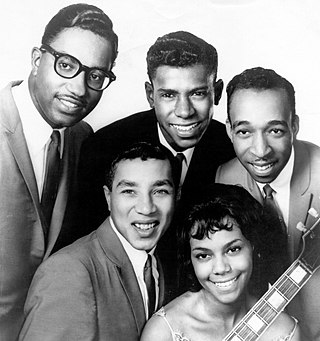
This article includes an overview of the events and trends in popular music in the 1960s.
Music of the United Kingdom developed in the 1960s into one of the leading forms of popular music in the modern world. By the early 1960s the British had developed a viable national music industry and began to produce adapted forms of American music in Beat music and British blues which would be re-exported to America by bands such as the Beatles, the Animals and the Rolling Stones. This helped to make the dominant forms of popular music something of a shared Anglo-American creation, and led to the growing distinction between pop and rock music, which began to develop into diverse and creative subgenres that would characterise the form throughout the rest of the twentieth century.

